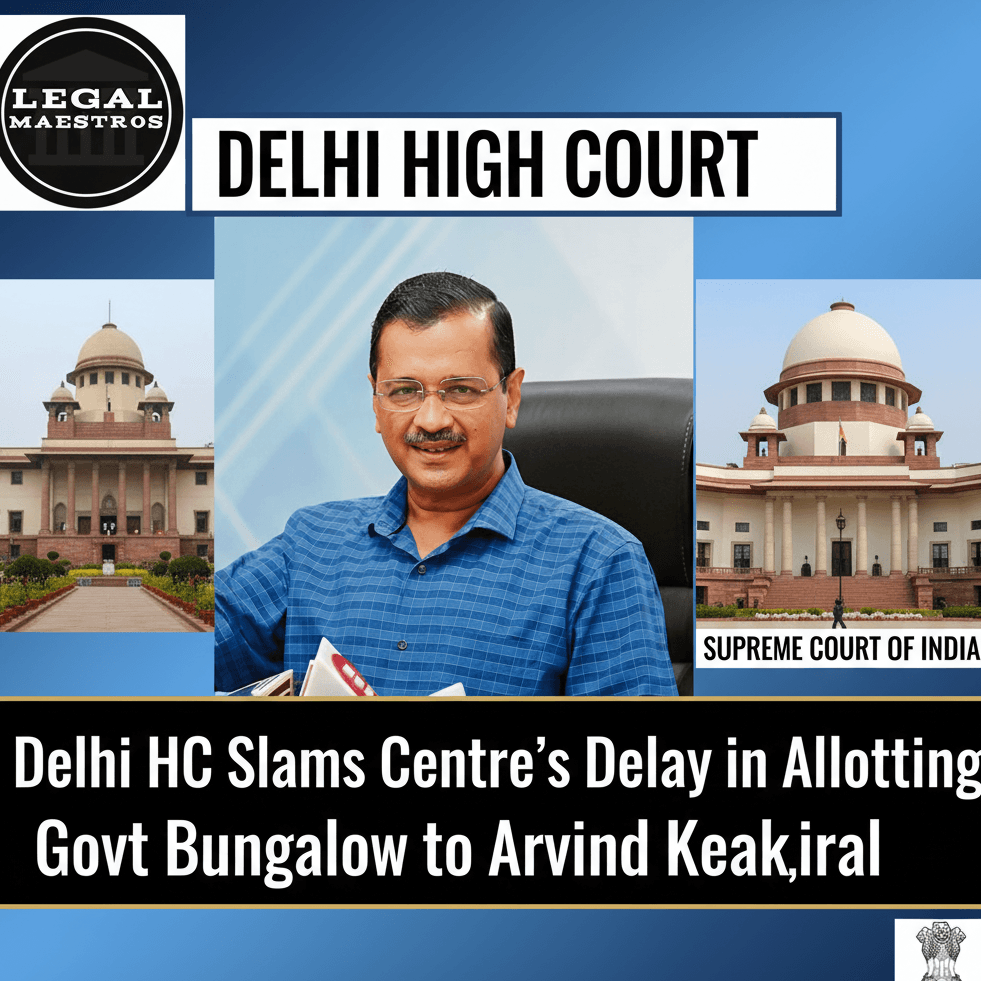
Delhi HC Slams Centre’s Delay in Allotting Govt Bungalow to Arvind Kejriwal
The High Court’s Stern Warning on Arbitrary Allotment
The Delhi High Court has hammered the Central Government with its high speed of refusing to give Arvind Kejriwal, the national convener of Aam Aadmi Party (AAP) and former Chief Minister of the state of Delhi a government bungalow. In the recent hearing, the court was categorical that the assignment of government residential dwellings cannot be left at the mercies of the authorities. This was a powerful observation to a petition that the AAP had filed complaining of the long delay and lack of transparency in the process. The position of the court gives emphasis on the rule that even in such a small issue as housing, the administration of the country should follow a clear and fair policy rather than discretion.
The Legal Framework and AAP’s Case
The petition filed by Aam Aadmi Party is based on the standing government policy which provides the right of the president of a national party to get a government house in Delhi. According to the party, since the AAP is a well recognized national party, the convener of the party, Arvind Kejriwal, meets all the prequalification criteria to receive such an allotment, given the fact that he does not own a house in Delhi, and is not occupied in any other official position. The plea emphasized the fact that the process has been unwarrantedly lengthy in spite of the many requests and his relinquishment of his former official home. The party particularly wanted to have a specific bungalow at 35, Lodhi Estate allotted which had just been vacated.
The Centre’s Response and the Court’s Displeasure
In its defense, the counsel in the Centre further told the court that the bungalow, at 35, at Lodhi Estate, had been already allotted to a Union Minister of State, a move that the court considered very dubious. This especially angered the court because even as the government was requesting adjournment in the case it proceeded to award the property to another person. The comments of the court were scathing as the court described the government act as a free system of everybody and how the system could not choose who will receive a house. The judges took it on board that they would like to review the set method of such allotment and how precedent is set and discretion is used.
For any queries or to publish an article or post or advertisement on our platform, do call at +91 6377460764 or email us at contact@legalmaestros.com.
A Broader Issue of Transparency in Governance
Not only in the particular instance of Arvind Kejriwal but also regarding the decision made by the Delhi high court, signifies a much greater challenge transparency and accountability in government. The instruction by the court to the government to cut an affidavit giving its policy of allocations, a disclosure of previous allocations and how the rules were put to practice are a big step towards making allotments fair. This may result in a cleaner and more universal system of giving out government housing, whereby there is limited chance of corruption and politics. The judicial intervention is an essential control over the exercise of power by the executive, which restates the rule of law.
The Judicial Scrutiny of Discretionary Power
A case in point of judicial review of discretionary power is the decision of the Delhi High Court. The demands of the court that there is a clear discernible policy and a transparent mechanism is a pillar in good governance. This case is a lesson that everything that the government does has to be grounded on objective standards and not a haphazard decision by those in power. The judiciary is also sending a strong message by ensuring that senior officials appear in the court to clarify how they came up with a decision because they are in charge. It is an accomplishment of the ideals of fairness, equity and the right of all citizens including the political leadership to be treated equally by the state.





![Research Assistantship @ Sahibnoor Singh Sindhu, [Remote; Stipend of Rs. 7.5k; Dec 2025 & Jan 2026]: Apply by Nov 14, 2025!](https://legalmaestros.com/wp-content/uploads/2025/11/Gemini_Generated_Image_s0k4u6s0k4u6s0k4-768x707.png)
![Karanjawala & Co Hiring Freshers for Legal Counsel [Immediate Joining; Full Time Position in Delhi]: Apply Now!](https://legalmaestros.com/wp-content/uploads/2025/11/Gemini_Generated_Image_52f8mg52f8mg52f8-768x711.png)
![Part-Time Legal Associate / Legal Intern @ Juris at Work [Remote]: Apply Now!](https://legalmaestros.com/wp-content/uploads/2025/11/ChatGPT-Image-Nov-12-2025-08_08_41-PM-768x768.png)
![JOB POST: Legal Content Manager at Lawctopus [3-7 Years PQE; Salary Upto Rs. 70k; Remote]: Rolling Applications!](https://legalmaestros.com/wp-content/uploads/2025/11/ChatGPT-Image-Nov-12-2025-08_01_56-PM-768x768.png)